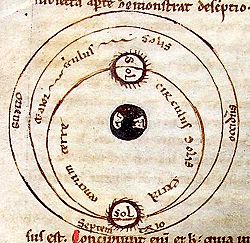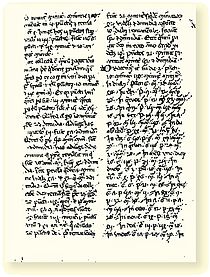Pedro Alfonso
Moshe Sephardic, later Petrus Alfonsi or Pedro Alfonso in homage to his protector Alfonso I of Aragon (Huesca, ¿1062?-¿ 1140?), was a Spanish writer, theologian and astronomer of Jewish origin who converted to Christianity in 1106.
Biography
Rabbi and conversant in mathematics and astronomy, he was the personal physician of Alfonso I of Aragon, who protected him and promoted his conversion to Christianity, being baptized in 1106 in Huesca by Bishop Esteban; later he was also physician to Henry I of England. The portrait of him engraved from the Liber Chronicarum cum figuris , an incunabula from 1493 that describes the physical appearance of various historical figures, has come down to posterity. It is he himself who provides us with the scant information we have about his life in the prologue that he put before his Dialogus contra iudaeos (Dialogue against the Jews). In it he recounts his conversion to Christianity and his baptism, which took place in 1106. Alfonso I was present as his godfather; he also informs us of his journey to England, where he taught liberal arts and astronomy and tutored Walcher, Prior of Malvern, in the Arabic astronomical tables. He had as a disciple Adelard of Bath. It is conjectured that he returned to Zaragoza around the year 1121 and after that date it is believed that he was in Tudela.
- Gayangos' Easter historian quotes in his work Writers in prose prior to the 15th century, (P.443) the reason of the name Pedro Alfonso:
«...Rabbi Moseh Sefardí, of Huesca, by another name Pedro Alfonso, who ordered him to call in 1106 his godfather Alfonso the Batallador. (...)
Analysis of his literary and scientific work
Dialogue against the Jews
His Dialogus contra iudaeos, translated as "Dialogues in which the impious opinions of the Jews are refuted by the most evident arguments of philosophy, both natural and divine, and explained the most difficult texts of the Prophets", was written after 1106 and its probable origin is to respond to the clamor that arose in the Jewish quarter due to its conversion. In it he used his extensive knowledge of the Torah and Jewish literature to argue against his former co-religionists using their same arguments, defending his new Christian faith. He also attacks, from a deep knowledge of it, the postulates of the Islamic religion. Other controversial writers of the time (Pedro Abelardo, Pedro el Venerable or Pedro de Blois), unlike that of Pedro Alfonso, suffer from a lack of understanding of the arguments of their adversaries, since they were unaware of the Talmud and Hebrew. In addition, the work of the Huesca responds to a sincere personal experience and, in the face of the aggressive tone of other polemicists, he adopts a conciliatory and didactic attitude.
Clerical Discipline
But his most widespread work is a very popular book of apologists in Latin entitled Disciplina clericalis that was disseminated and translated throughout Europe in such a way that some sixty universal novelists of all times and all learned languages owe something to him, among them Giovanni Boccaccio, don Juan Manuel, Dante Alighieri, Juan Ruiz, Alfonso Martínez de Toledo, Miguel de Cervantes and Lope de Vega. This book was the first source of introduction in Christian Europe of the oriental narrative through its 33 apologists taken from Arab sources and ultimately Persian and Hindu, as well as a large number of Persian, Hindu and other Oriental moral sentences., since these are the genres of which the book is made up, which composed "part of proverbs of the philosophers and their teachings, part of Arab proverbs and advice and fables and verses, and part making use of comparisons with birds and animals." The source material he uses is grouped as follows:
- Prologue about "the fear of God" in which the Almighty is thanked for the inspiration to compose a book by translating it into Latin
- 1. Vicios and virtues of man as an individual.
- 2. Human relations: man in society with his fellow men, women and neighbors.
- 3. Relationship of man with earthly (king) and divine (God) authority brevitas vitae.
The text ends by taking up the idea of the prologue and an epilogue consists of an invocation to God. Many of these apologists went on to El conde Lucanor by Don Juan Manuel. Together with Sendebar, Calila e Dimna and Libro de los enxiemplos por ABC by Clemente Sánchez de Vercial, where it appears in its entirety, it constitutes one of the main repertoires of medieval short stories and was published for the first time in 1824, in France; it was reprinted in 1948 and in London in 1977.
Scientific work
Regarding his scientific work, the testimonies extracted from his scholarly English disciples (Walcher or Adelardo) allow him to be associated with the composition of two works: De Dracone, which studies the calculation of movements of the stars, and De Astronomia, some astronomical tables according to the Arabic, Persian and Latin calendars, by means of which and with the help of an astrolabe it was possible to find out, for the first time and exactly, the positions of the sun, the moon, the five known planets and the ascendants and descendants. The work is preceded by a Letter to the French peripatetics, composed in epistolary form in 1120 and important for the so-called Renaissance of the 12th century because it highlights the importance of arithmetic, a useful science for geometry, music, medicine, astronomy, and the "business of the century." His approach is rationalist and recovers authorities such as Aristotle and Ptolemy.
Pedro Alfonso taught the use of the astrolabe and the quadrant to the French and the English and also translated the astronomical tables of Al-Juarismi and, together with other Aragonese such as Abraham Ben Ezra and Abraham bar Hiyya, contributed to disseminate Arabic science in the West, since it initiated Christian Europe in the study of astronomy.
Transcendence
Apart from his scientific and astronomical contributions to the ignorant Europe of his time, his apology in defense of Christianity against Islam and Judaism was used by theologians and preachers in the Crusade and his collection of exempla Disciplina clericalis introduced the short story of oriental origin throughout Europe.
Work
- Dialogus against iudas.
- Discipline clericalis.
- De dracone.
- Astronomy, work found in two manuscripts, the Arundel (270, foll. 40v – 44r, centuryXIIand No. 1283 from Oxford College Corpus Christi, both studied and published by Professor Millás Vallicrosa.
- Letter to the French peripathetics.


